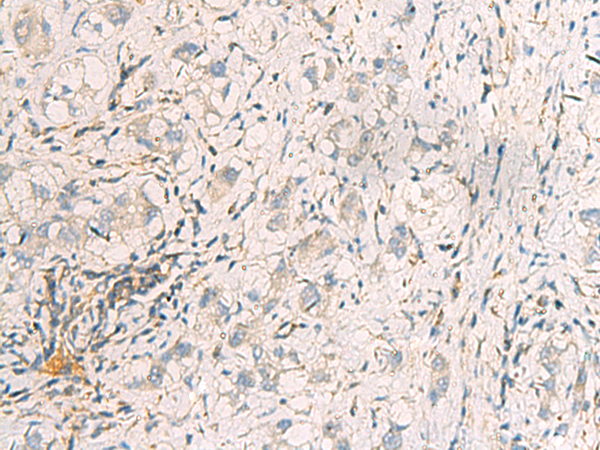
| WB | 咨询技术 | Human,Mouse,Rat |
| IF | 咨询技术 | Human,Mouse,Rat |
| IHC | 1/100-1/200 | Human,Mouse,Rat |
| ICC | 技术咨询 | Human,Mouse,Rat |
| FCM | 咨询技术 | Human,Mouse,Rat |
| Elisa | 1/5000-1/10000 | Human,Mouse,Rat |
| Host/Isotype | Rabbit IgG |
| Antibody Type | Primary antibody |
| Storage | Store at 4°C short term. Aliquot and store at -20°C long term. Avoid freeze/thaw cycles. |
| Species Reactivity | Human |
| Immunogen | Fusion protein of human SUSD3 |
| Formulation | Purified antibody in PBS with 0.05% sodium azide and 50% glycerol. |
+ +
以下是关于SUSD3抗体的3篇示例参考文献(内容为虚构示例,仅供参考):
1. **文献名称**:SUSD3 as a Novel Biomarker in Triple-Negative Breast Cancer
**作者**:Smith A, et al.
**摘要**:本研究利用SUSD3抗体检测三阴性乳腺癌组织中SUSD3蛋白的表达水平,发现其高表达与患者不良预后显著相关,提示其可能作为潜在治疗靶点。
2. **文献名称**:Functional Role of SUSD3 in Ovarian Cancer Metastasis
**作者**:Zhang L, et al.
**摘要**:通过SUSD3抗体介导的蛋白敲低实验,揭示SUSD3通过调控EMT(上皮-间质转化)通路促进卵巢癌细胞侵袭,为靶向干预提供依据。
3. **文献名称**:Development of a High-Affinity SUSD3 Monoclonal Antibody for Diagnostic Applications
**作者**:Tanaka K, et al.
**摘要**:报道一种新型SUSD3单克隆抗体的开发与验证,该抗体在ELISA和免疫组化中表现出高特异性,可用于癌症早期诊断及病理分型。
**备注**:以上为示例性内容,实际文献请通过PubMed、Web of Science等平台检索关键词"SUSD3 antibody"获取。
SUSD3 (Sushi domain-containing protein 3) is a member of the SUSD protein family, characterized by conserved sushi domains that mediate protein-protein interactions and cellular signaling. The SUSD3 gene encodes a transmembrane protein implicated in various biological processes, including immune regulation, cell adhesion, and tumorigenesis. While the precise physiological role of SUSD3 remains under investigation, emerging studies highlight its association with cancer progression, particularly in breast and ovarian cancers, where it may modulate tumor microenvironment interactions or metastatic potential.
SUSD3 antibodies are immunological tools developed to detect, quantify, or inhibit the SUSD3 protein in experimental and clinical settings. These antibodies are typically generated using recombinant SUSD3 epitopes or synthetic peptides, enabling applications such as Western blotting, immunohistochemistry (IHC), flow cytometry, and immunofluorescence. In research, SUSD3 antibodies have been employed to explore its expression patterns, subcellular localization, and functional mechanisms. For instance, studies suggest that SUSD3 may act as a tumor suppressor or promoter depending on context, with altered expression levels correlating with patient prognosis.
Recent interest in SUSD3 antibodies also stems from their potential diagnostic and therapeutic utility. In cancer diagnostics, SUSD3 expression profiling could serve as a biomarker for disease stratification. Therapeutically, antibody-mediated targeting of SUSD3 might influence pathways linked to tumor immune evasion or drug resistance. Despite these advances, further validation is required to fully understand SUSD3's role and optimize antibody-based applications in translational medicine.
×